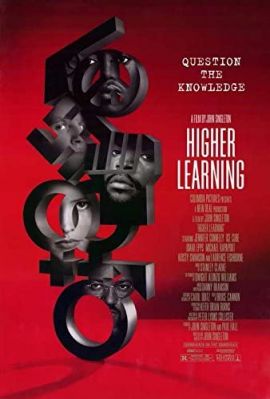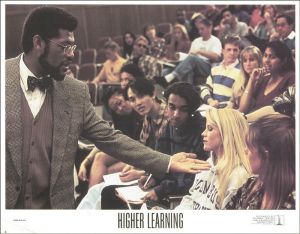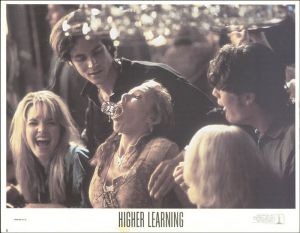Higher Learning (1995)
Higher Learning is American drama film written and directed by John Singleton who released on January 11, 1995 in United State. This 127-minute movie tells about race and sexual prejudice. The color life on a micro-university campus turns out to be a small example of ruthlessly showing the same frustration. Here, everyone can judge from the appearance, from the white fraternity boy drinking beer to the black student who likes to rap, these students are threatened by the campus police.[1] who starring
- Jennifer Connelly as Taryn
- Ice Cube as Fudge White
- Omar Epps as Malik Williams
- Michael Rapaport as Remy
- Kristy Swanson as Kristen Connor
- Laurence Fishburne as Professor Maurice Phipps
Contents
Plot
This drama explores the close, political, and racial dilemmas faced by a group of freshmen during their first semester at Columbus University. Malik Williams is an African-American student who received a runway scholarship; scholars are not his strong suit, and he hopes his athleticism will lead him to college freely. Fudge, a "professional student" who has been in Columbus for six years, became a friend of Malik and questioned his views on American race and politics, while the black man who taught political science, Maurice Phipps firmly assured Malik that he would not rank differently because of his race or his ability to run fast. Accompanied by Deja (Tyra Banks), Malik found a girlfriend, a mentor, and a training partner, all of whom became one.
Meanwhile, Kristen Connor, a young woman from California, drank too much in a beer explosion and met a boy named Billy (Jay R. Ferguson). Christine eventually became a victim of date rape and joined a feminist campus organization in response to a painful encounter. While working with women’s groups, Kristen met Taryn, a strong and understanding woman and a lesbian, she found herself very attractive to her. Remy is a problematic youth from Idaho. He is lost in the multicultural atmosphere of Columbus. Racist skinhead member Scott Moss (Cole Hauser) met with him, and he claimed that Remy was the best person to help his group achieve its violent goals.[2]
Pros
Higher education has nothing to do with him (John Singleton). It's bigger. Higher education is about America. His most prescient work "Higher Education" reflects the doubts of American society and the depth of the gap created by the country's social structure.[3]
“I make films because I have something to say and I have a vision of what I want to get across,” he also say on Hollywoodreporter.com “They want black people to be who they want them to be, as opposed to what they are.” and answered, “They’re trying to. They’re always trying to.” When the interviewer asked him if he felt that the studio was trying to restrict his freedom as a director. He explained that black directors have only received so much funding and such high expectations that few people support them.[4] -John Singelton as a DIrector.
And for Roger Ebert he believes that campuses should encourage students from all races and locations to get to know each other, rather than stereotyped self-righteousness. [5] (give 3 stars out of 5)
Controversy
Brad Laidman on Filmthreat.com believes that every black man who makes a film must have some important information about the racial situation in the United States. "But surprisingly, this is as much as a gang movie"[6]
"He (John Singleton) to try again" from Mick LaSalle, who think that it seems misguided and his previous film is better than this. "It may take more time before the 27-year-old Singleton is able to reach the same heights as an experienced film maker that he reached with such spontaneity and honesty in his first film. In the meantime, "Higher Learning" does not point in a fruitful direction. The greatness of "Boyz N the Hood" had little to do with the fact that it was the kind of movie people expect from a black film maker. It was great because Singleton gave us something he knew about and felt strongly about. He needs to try that again."[7]
This movie is embarrassing. It has a great message to send, but it annoys you. This movie raises some very interesting questions, but sometimes it is ubiquitous and annoying..[8]
It also shows that when the police abused black students and many white students, they only called them "gang members" because they saw black faces, thus expressing racist micro-aggression.[9]
Reference
- ↑ https://www.nytimes.com/1995/01/11/movies/film-review-higher-learning-short-course-in-racism-on-a-college-campus.html
- ↑ https://www.historyforsale.com/higher-learning-movie-cast-lobby-card-unsigned-usa-1995/dc259651
- ↑ https://www.theguardian.com/film/2019/may/04/higher-learning-john-singletons-forgotten-masterwork
- ↑ https://www.theguardian.com/film/2019/may/04/higher-learning-john-singletons-forgotten-masterwork
- ↑ https://www.rogerebert.com/reviews/higher-learning-1995
- ↑ https://filmthreat.com/uncategorized/higher-learning/
- ↑ https://www.sfgate.com/entertainment/article/Learning-Sleeps-Through-Class-Boyz-director-3048451.php
- ↑ https://lovingthestories.blogspot.com/2014/02/higher-learning.html
- ↑ https://www.theguardian.com/film/2019/may/04/higher-learning-john-singletons-forgotten-masterwork


